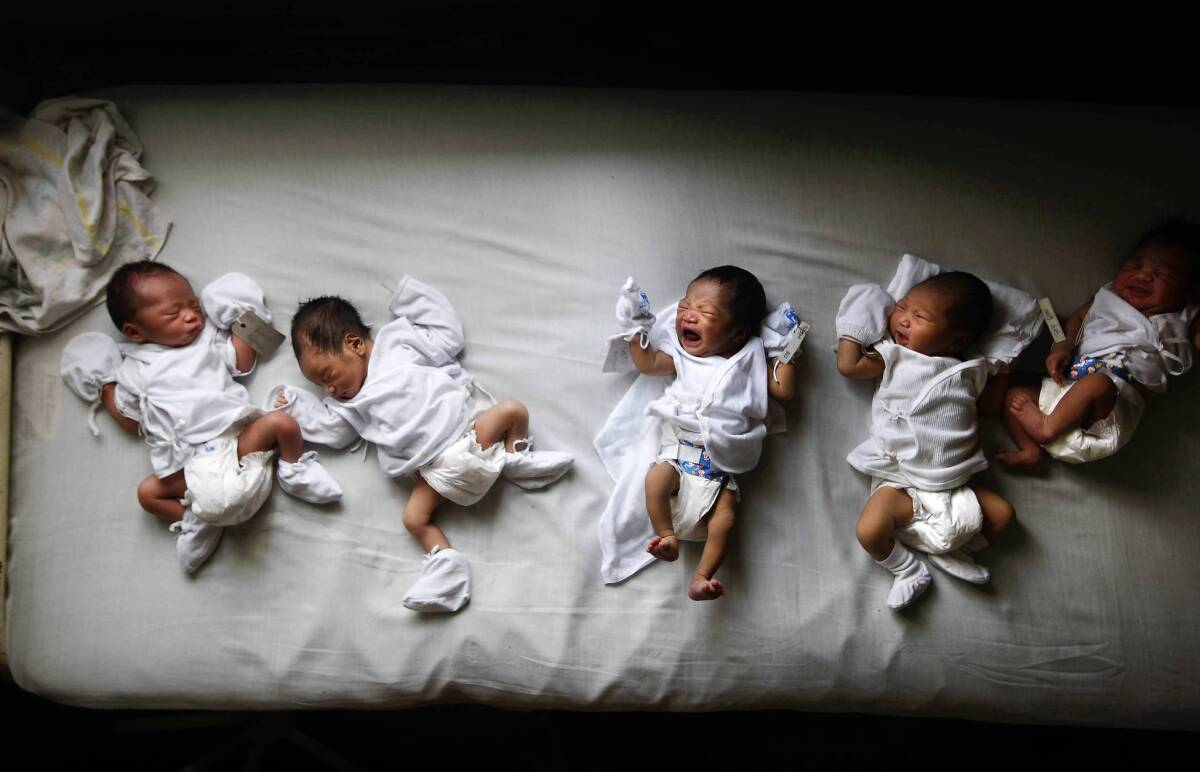Letters: The world’s population explosion

- Share via
Re “A church’s choice,” last of five parts, July 29
The horror created by Roman Catholic clerics in the Philippines begs for a new reformation by more thoughtful followers of the faith.
The bishops pretend to promote a “culture of life” by pressuring politicians to halt the distribution of contraceptives; in fact, they promote a culture of death with more starving children. Wrongly conflating contraception with abortion leads to more actual abortions.
Human beings might be able to adapt to the global changes taking place; however, they could starve the planet’s life if the science that offers a way to prevent unwanted pregnancies is ignored.
Gary Hoffman
Huntington Beach
The Catholic Church in the Philippines is an easy target. All it is doing is trying to uphold God’s will.
The Times overlooks the fact that the church was founded by Jesus Christ. This isn’t just another organization that can arbitrarily set its own rules. To cave in on what the world holds as a decision made by individuals would run against the teaching of Jesus, who gave the church the authority to bind and loosen. So disobedience to God is advocated by those opposed to the bishops.
Unnatural contraception is contrary to moral law. There is another approach that the church advocates: responsible, natural family planning, a stance that is overlooked by those who attack the church on this issue.
Charles Voelker
Palm Desert
I applaud your courage in not pulling any punches in your front page article describing the suffering inflicted on the living by the dominance of the “culture of life” foisted on Philippine society by the (supposedly) celibate males of the Catholic church.
Much evil in the world has stemmed from supposedly good intentions. It is not an exaggeration to apply the term evil to the church’s imposition of papal dicta constraining reproductive choices not only on its adherents, but on the nonbelievers compelled to live beneath its political stranglehold.
Keep up the good work.
Janet Weaver
Huntington Beach
As a Catholic, I am embarrassed by the position my church takes on birth control. Priests seldom raise the subject in the more educated parishes of the U.S. and Europe. The majority of young Catholics in those regions simply won’t listen to it.
Instead, the message goes out to poor and illiterate souls, thus guaranteeing their future of poverty, misery, hopelessness and, ironically, higher rates of abortion. It is a shame, because the church could be an instrument of such good if only it changed its archaic position.
As Galileo said, “I do not feel obliged to believe that that same God who has endowed us with senses, reason, and intellect has intended us to forgo their use.”
Roger Tim Haug
Torrance
Re “Beyond 7 billion,” five-part series, July 22, 24, 26, 27 and 29
I am so impressed by the stellar journalism of reporter Kenneth Weiss and the photography of Rick Loomis in your series on the undeniable impact overpopulation is having on our planet. I have felt incredulous for years that everyone worries about the environment, but no one mentions how 7 billion people affect the planet.
We desperately need the information you report. I have no children, but it doesn’t make me sleep any better to know I won’t be contributing to the misery of future generations. Thank you for publishing this wake-up call.
Jan Bunker
Rancho Palos Verdes
There is an “easy” answer to boosting world food production to feed our growing population, should we choose to do so. Right now, the world could feed nearly a billion more people if only the grain fed to farmed animals was consumed directly by humans instead.
Cutting out the middle animal is perhaps the single best step we can all take to ensure that everyone on this planet has enough to eat, and in the process, we’d end the cruelty inherent in an industry that slaughters billions of sentient beings every year.
Rebecca LeMaitre
New York City
I was deeply saddened to read of the families suffering from poverty, often because of a lack of access to family planning services. As an advocate for the humanitarian organization CARE, I also know many of these challenges can be solved by empowering women and girls.
In many of the countries featured, the low status of women and girls is linked closely with their inability to exercise their sexual and reproductive rights. When women and girls are empowered and able to access health services, they have the power to lift families, communities and entire nations out of poverty.
If we realize and act upon the simple link between women’s empowerment and reducing global poverty, we can meet the challenges of our future.
Tania Anderson
Reseda
Thank you for your series. It confronted the No. 1 problem that compromises the sustainability of human life, that is, human life itself. At an alarming rate, we are devouring the natural capital that sustains us.
The issue must not be conflated with saving the planet. Just as it is fine without the dinosaurs, the planet will be fine without humans once it can no longer supply the needs of a human population run amok.
If governments provide nothing else for their citizens (or foreign aid for others), it should be free birth control and education for everyone.
Sara R. Nichols
Los Angeles
ALSO:
Letters: Wrestle for the White House
Letters: Films that celebrate violence
Letters: Coping with graduate studies
More to Read
A cure for the common opinion
Get thought-provoking perspectives with our weekly newsletter.
You may occasionally receive promotional content from the Los Angeles Times.






